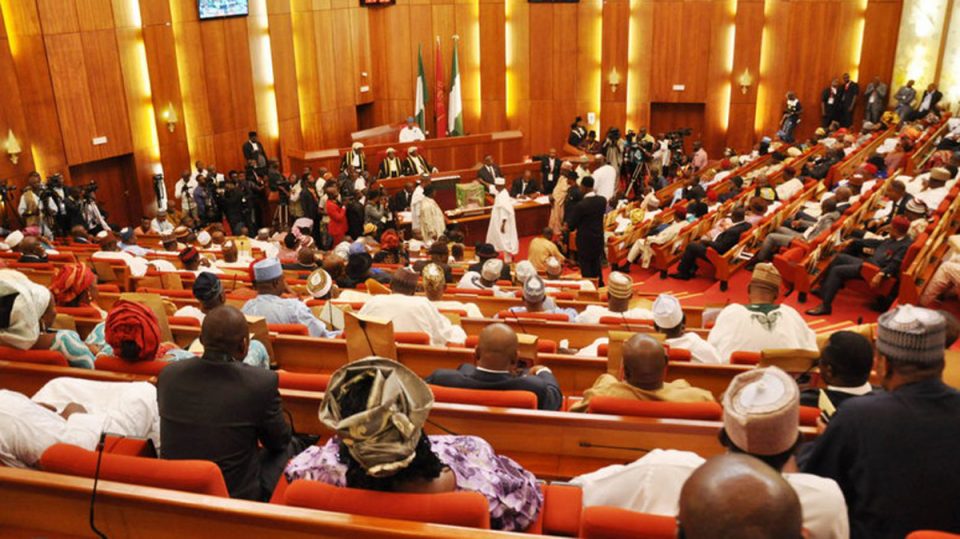The Senate has said that it is already planning a comprehensive legislative intervention that will ensure that workers in the private sector do not suffer job losses as a result of the outbreak of COVID-19 in the country.
The upper chamber, however, promised to unfold its agenda after a robust engagement with the Minister of Finance, Zainab Ahmed, to know the specific plans by government to prevent private firms from collapsing.
It appreciated the moves by the Central Bank of Nigeria and the Bankers Committee to save the jobs of workers in the banking industry.
The Chairman, Senate Committee on Finance, Senator Solomon Adeola, gave the explanation in an interview with SundayPUNCH.
He said, “We are planning to invite the Minister of Finance to find out additional measures already put in place to ensure that workers in Nigeria are not laid off. This will guide our line of thought on how we could come up with legislative interventions that can protect the jobs of Nigerians.
“As we all know, the executive arm of government is already trying its best, within the confines of the law. What we, as a legislature, can do is to still liaise with the executive because if we make any pronouncement now, we don’t know what the government has done or being done to assist the private firms.
“Before we make a pronouncement from the legislative point of view, we need to know the current state of things with the companies who are planning to lay off staff. We need to know what they are doing with the executive arm of government which has its full responsibility of liaising with them.
“As a Senate, we have to assess the economic situation in the real terms before we make any pronouncement because we need to be guided.
“We are happy that already, the executive is taking the bull by the horns. The Central Bank and the Bankers Committee made a pronouncement that there should be no lay-offs.
“The Federal Government is working round the clock to ensure that the post-COVID-19 fallout does not have an adverse effect on the economy and by extension, on the generality of the people.
“Going forward, we are ready to work closely with the executive on any decision that would be taken to alleviate the sufferings of Nigerians and also by extension, ensure that nobody is laid off from his or her workplace. We are working, watching and looking at all these things.”
Adeola clarified that the National Assembly was still expecting the executive to present to it the amendments made to the 2020 budget.
He said the amendments would accommodate the N500bn being proposed by the Federal Government as part of its intervention in fighting COVID-19.
He admitted that the federal parliament at the moment did not have the details of the beneficiaries of the N500bn intervention fund.
He said, “The N500bn intervention fund is still undergoing process. The executive has incorporated it in the proposal they are bringing for amendment to the National Assembly.
“The budget document is still a work in progress. It is still within the executive, it has not been sent to the National Assembly.
“Until it is laid, we don’t know the components of the N500bn. We don’t know what it would be spent on and details of the beneficiaries.
“It is meant to be an intervention fund during the ongoing fight against COVID-19.”
He added that the Senate was not expecting official communication from the President, Major General Muhammadu Buhari (retd) on the N850bn loan currently being sourced by his regime from the local capital markets.
The Chairman of the Senate Committee on Special Duties, Senator Yusuf Yusuf, had said that the upper chamber had yet to receive details of the proposed N850bn loan from the President.
But Adeola told Sunday PUNCH that the details were already in the 2020 Appropriation Act, passed by the nation’s parliament late last year.
Adeola said, “We are not expecting details of the N850bn loan request from the President because the money is already in the 2020 Appropriation Act passed by the National Assembly.
“It is not a fresh loan request. The capital component of the budget was to be funded with foreign and domestic borrowing.
“50 per cent was expected from foreign loans and 50 per cent from the local sources.
“While the local sources are being taken care of, access to the foreign loans is being hampered by the global pandemic that has taken over the whole world.
“That is why the Federal Government decided to change the strategy by beaming its searchlight on the domestic borrowing arrangement.
“If not for the global pandemic, the Federal Government would have taken the foreign loans, but since that is becoming difficult, it decided to borrow the same amount locally.
“However, to enable the executive do that, they needed the Senate approval to avoid any argument.
“The money would be used to fund the capital projects contained in the 2020 budget.
“It is even cheaper for the country to borrow locally than go after foreign loan because of the exchange rate,” he added




